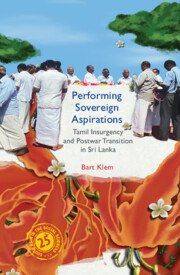Book contents
- Frontmatter
- Dedication
- Contents
- List of Illustrations
- Acknowledgements
- A Typographical Note on Separatism
- List of Abbreviations
- 1 Introduction
- 2 Sovereignty, Performativity and Tamil Nationalism in Sri Lanka
- 3 Performing an Insurgent Sovereign Experiment
- 4 Reconstituting ‘Pure Tamil Space’ after Sovereign Erasure
- 5 The Bureaucratic Evolution of Devolution
- 6 Tamil Nationalist Anti-politics in the Wake of Defeat
- 7 Conclusion
- Epilogue
- Glossary
- References
- Index
2 - Sovereignty, Performativity and Tamil Nationalism in Sri Lanka
Published online by Cambridge University Press: 30 April 2024
- Frontmatter
- Dedication
- Contents
- List of Illustrations
- Acknowledgements
- A Typographical Note on Separatism
- List of Abbreviations
- 1 Introduction
- 2 Sovereignty, Performativity and Tamil Nationalism in Sri Lanka
- 3 Performing an Insurgent Sovereign Experiment
- 4 Reconstituting ‘Pure Tamil Space’ after Sovereign Erasure
- 5 The Bureaucratic Evolution of Devolution
- 6 Tamil Nationalist Anti-politics in the Wake of Defeat
- 7 Conclusion
- Epilogue
- Glossary
- References
- Index
Summary
This chapter establishes the theoretical underpinnings of this book and clarifies key concepts and ideas. More specifically, it reviews debates on the question of sovereignty and its murky status as the central referent of global political order, and it advances the perspective of performative politics to grapple with the contradictions and ambiguities that prevail in the context of sovereign contestation. The chapter then proceeds to apply this perspective to the Tamil nationalist movement in Sri Lanka. In doing so, it also provides the reader with essential contextual and historical background to the chapters that follow.
The notion of the sovereign state as the legitimate authority over people and territory is deeply inscribed in prevalent understandings of the world today – as the referent of law, authorised force, national citizenship, democratic rule and international order. It is embedded in a whole architecture of norms and claimed entitlements. However, this framework of legitimation is ultimately circular: sovereign states are sovereign because they are. This circularity becomes exposed when the fundamentals of a state are challenged (Pegg 1998, 2017). Such confrontations come in myriad forms – indigenous communities resisting settler states, such as in Australia (Schaap 2004), Canada and the United States (A. Simpson 2014); occupied territories with a government in exile, like Tibet (McConnell 2016) or Western Sahara (Alice Wilson 2016), or a constellation like the Syrian Interim Government (Gangwala 2015; Sosnowski, under review); governments with incomplete or faltering sovereign recognition, such as the Palestinian Authority (Feldman 2008; Kelly 2006), the Turkish Republic of North Cyprus (Bryant and Hatay 2020; Navaro-Yashin 2003), Transnistria (Bobick 2017), Abkhazia (Preltz-Oltramonti 2017), Kosovo (Krasniqi 2019; Van der Borgh 2012), Taiwan (Corcuff 2012; Friedman 2021) or Hong Kong (Yep 2013); insurgent groups that demand reunification with a neighbouring state, as in Northern Ireland (Aretxaga 1997; Little 2014); or separatist movements as in Catalonia (Achniotis 2021; Bárcena 2020; Enguix Grau 2021), Kurdistan (Gunes 2012; Watts 2010), northeast India (Baruah 2007) and Myanmar (Brenner 2017) – and, as discussed in this book, in northeastern Sri Lanka.
By challenging the foundational premises of state sovereignty, these movements unsettle the self-referential cycle of analytical and normative claims that undergird the notion of legitimate state sovereignty.
- Type
- Chapter
- Information
- Performing Sovereign AspirationsTamil Insurgency and Postwar Transition in Sri Lanka, pp. 17 - 47Publisher: Cambridge University PressPrint publication year: 2024
- Creative Commons
- This content is Open Access and distributed under the terms of the Creative Commons Attribution licence CC-BY-NC 4.0 https://creativecommons.org/cclicenses/

